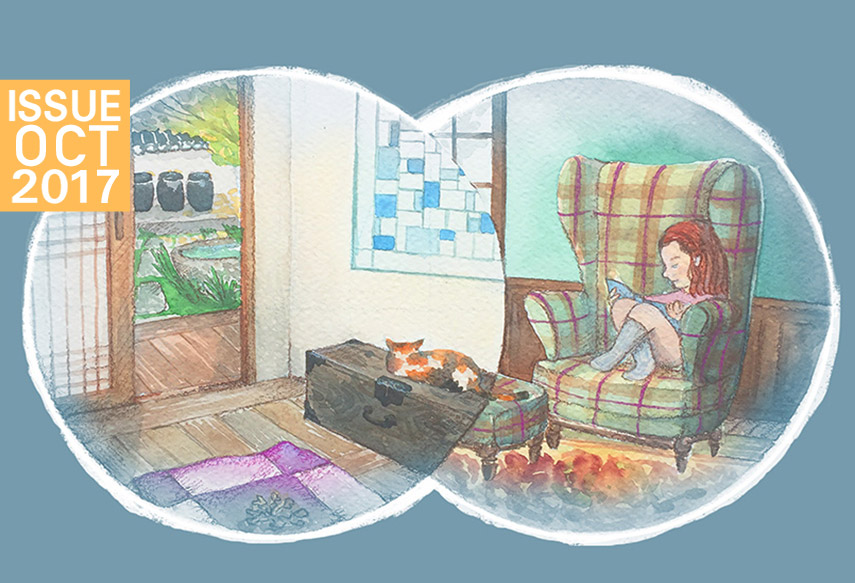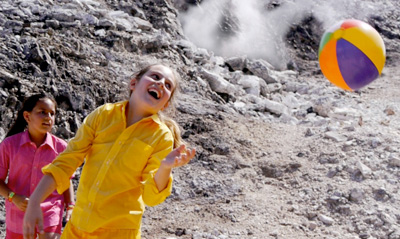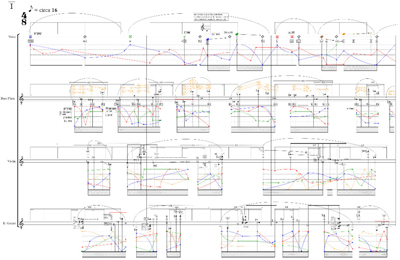- Featuring
- Monchoachi
- Yasujiro Ozu
- Mikhail Karikis
- Maryam Madjidi Peter Mitchell on Nicola Pugliese
- Bernard Hœpffner and Ricardo Piglia
Welcome to our Fall 2017 issue and to its paradoxical Interiors, at once distant and familiar. Hailing from 31 countries, our contributors include two who sadly left us this year: revered Argentine author Ricardo Piglia and star translator Bernard Hœpffner, whose body was found off the coast of Wales in June. Along with startling vignettes contributed by Yasujiro Ozu, famed director of Tokyo Story, their knock-out essays offer us a way to commemorate lives dedicated to the pursuit of art. We also present new translations of Lu Xun, father of modern Chinese literature, and of the great Marina Tsvetaeva, with a selection of her political poems. These are featured alongside the work of rising stars such as Akhil Sharma, the Indian-American novelist who won the 2016 International DUBLIN Literary Award for Family Life; Bibi Slippers, the Afrikaans poet whose first collection was published just last year to critical acclaim; and Maryam Madjidi, winner of this year’s prestigious Goncourt Prize for a first novel.
Maryam Madjidi headlines our New Voices in French Literature showcase, comprising six stories which are all connected in some way to the figure of the mother. In Madjidi’s powerful fiction, we witness the Iranian revolution through the eyes of an unborn child. Valentine Goby’s stunning novel excerpt is about an abortionist and her executioner, and should be paired with Togolese author Michel Faleme’s unforgettable point-of-view rendering of an execution. If Camus’ Meursault once shocked us with his emotional alienation, opening his novel with “Today, mother died,” Frédérique Martin’s unsentimental narrator takes it one step further in The Despair of the Roses: “I sold my mother the other day.”
Leading off our regular fiction section, beloved Catalan writer Miquel de Palol touches the real in all its vertiginous vastness in childhood moments spent face to face with the cosmos. And seemingly in response to Palol’s unflinching contemplation of the world without, Karine Nyborg plunges into the inchoate and the unrepresentable: “The gap that opens up within me from time to time is difficult to describe,” she begins. For the characters drawn by Iraqi playwright Karim Rashid, that interiority instead recalls the unbearably vivid scenes of trauma: “It’s the same nightmare every night.” Returning to more comforting interiors, Saba Ahmed reviews Lydia Davis’ translations of letters by the very icon of inner life, Marcel Proust. Rather than leaving his carefully maintained apartment, Proust wrote many letters . . . to his upstairs neighbor.
“Who am I?” Lu Xun’s narrator awakens to this perplexing question, and the world continues to intrude upon his attempt to compose a story, The Happy Family. A translator might also entertain self-doubts after reading Bernard Hœpffner’s piece comparing the translator to a “con-man” and an artist of “craftsmanship and craftiness, versatility and trickery.” Turkish visual artist Yigit Kolat shows us yet another one of the translator’s guises by “mistranslating” data into music. His work is paired with that of Greek-British artist Mikhail Karikis, whose community-based projects are devoted to the soundscapes of labor and industry and raise the question: How can one be both a group and an individual?
Elsewhere, don’t miss new work by Monchoachi, the poet whom Patrick Chamoiseau credits with “renew(ing) our vision of the Creole language,” Steve Komarnyckyj’s introduction to Ukraine’s “executed renaissance,” M. René Bradshaw on Equatorial Guinea’s leading dissident writer, Dylan Suher’s portrait of translator Patrick Hanan, Peter Mitchell’s review of Nicola Pugliese's Malacqua in the age of Hurricane Harvey, and Catherine Léger’s drama about a sexual indiscretion caught on tape. As with most good literature, the offerings in the Fall Asymptote, accompanied by specially commissioned illustrations from guest artist Jiin Choi, can help you reflect on the issues of the day.
We’re about a month away from unveiling a revolutionary way of discovering world literature. If you’re interested in helping us make it a reality, hop over to this reader survey right now! To make sure you’ll be first to receive news of it, subscribe to our fortnightly newsletters at our newly revamped page with an easy-to-remember URL (http://tinyurl.com/asymptoteme) or follow us on Twitter, Tumblr, or Facebook, which we also have in Spanish and now in French (c’est vrai!). While you enjoy the many spoils of our Fall 2017 issue, do bear in mind that “World literature isn’t inevitable or automatic,” as critic Martin Puchner writes. “Colonialists, nationalists, enemies of the market, advocates of censorship have all opposed the circulation of literature, and continue to do so. This means that world literature is an achievement that, without active support, can be lost.” Help us stick around by making a one-time tax-deductible donation or, better yet, signing up as a sustaining member. Get involved with Asymptote today!
—Lee Yew Leong, Editor-in-Chief
Editorial Team for Issue Oct 2017
Editor-in-Chief: Lee Yew Leong (Taiwan/Singapore)
Assistant Managing Editors: Sam Carter (USA), Janani Ganesan (India), and Jacob Silkstone (Norway/UK)
Section Editors:
Lee Yew Leong (Taiwan/Singapore)
Aditi Machado (India/USA)
Joshua Craze (UK/USA)
Caridad Svich (USA/UK)
Ellen Jones (UK)
Henry Ace Knight (USA)
Ah-reum Han (South Korea/USA)
Eva Heisler (USA)
Editor of New Voices in French Literature showcase: Lee Yew Leong (Taiwan/Singapore)
Assistant Editors: Alexis Almeida (USA), Lizzie Buehler (USA), Victoria Livingstone (USA), Erik Noonan (USA), Chris Power (USA), P. T. Smith (USA), and Lin Chia-wei (Taiwan)
Senior Editor (Chinese): Chenxin Jiang (Germany/Hong Kong)
Contributing Editors:
Ellen Elias-Bursac (USA), Howard Goldblatt (USA), George Henson (USA), Aamer Hussein (Pakistan/UK), Sylvia Lin (Taiwan/USA), Sayuri Okamoto (Japan/Italy), Sim Yee Chiang (Singapore), Antony Shugaar (Italy), Dylan Suher (USA) and Adrian West (USA)
Chinese Contributing Editor: Francis Li Zhuoxiong (Hong Kong/Taiwan)
Spanish Contributing Editor: Soledad Marambio (Chile/USA)
Translation Tuesdays Editor: Lee Yew Leong (Taiwan/Singapore)
Podcast Editor: Dominick Boyle (Switzerland/USA)
Art Director: Lee Yew Leong (Taiwan/Singapore)
Director, Educational Arm: Lindsay Semel (USA)
Educational Arm Assistant: Laura Davies (Wales)
Editor-at-large, Argentina: Sarah Moses
Editor-at-large, Australia: Tiffany Tsao
Editors-at-large, Brazil: Maíra Mendes Galvão and Lara Norgaard
Editor-at-large, Chile: Tomás Cohen
Editor-at-large, Egypt: Omar El Adl
Editor-at-large, Guatemala: José García
Editor-at-large, Hong Kong: Charlie Ng Chak-Kwan
Editor-at-large, Indonesia: Norman Erikson and Valent Mustamin
Editor-at-large, Iran: Poupeh Missaghi
Editor-at-large, Mexico: Paul Worley and Kelsey Woodburn
Editor-at-large, Morocco: Hodna Nuernberg
Editor-at-large, Romania and Moldova: MARGENTO
Editors-at-large, Singapore: Theophilus Kwek and Tse Hao Guang
Editor-at-large, Slovakia: Julia Sherwood
Editor-at-large, South Africa: Alice Inggs
Editor-at-large, Taiwan: Vivian Chih
Editor-at-large, Tunisa: Jessie Stoolman
Editor-at-large, UK: Megan Bradshaw
Masthead for Issue Oct 2017
Fiction: Lee Yew Leong
Nonfiction: Joshua Craze
Poetry: Aditi Machado
Drama: Caridad Svich
Criticism: Ellen Jones
Writers on Writers: Ah-reum Han
New Voices in French Literature showcase: Lee Yew Leong
Visual: Eva Heisler
Interviews: Henry Ace Knight
Illustrations and Cover: Jiin Choi
Chief Executive Assistant: Sarah Burik
Senior Executive Assistant: Alice Fischer
Executive Assistants: Emily Cocco, Emma Holland and Cassie Lawrence
Asst. Blog Editors: Sneha Khaund, Stefan Kielbasiewicz, and Aurvi Sharma
Assistant Interviews Editor: Claire Jacobson
Guest Artist Liaison: Berny Tan
Chief Copy Editor: Laura Garmeson
Proofreaders: Laura Garmeson, Lorenzo Andolfatto, Anna Aresi, Catilin O’Neil, Noah Ross, and Lara Zammit
Technical Manager: József Szabó
Assistant Director of Outreach: Evelyn Chin
English Social Media: Sohini Basak, Thea Hawlin, and Hannah Vose
Spanish Social Media: Sergio Serrano
Chinese Social Media: Jiaoyang Li and Jessica Wang
Assistant Newsletter Editor: Talia Behrend-Wilcox
Marketing Manager: Giorgos Kassiteridis
Assistant Graphic Designer: Eliza Chen, Geneve Ong, and Kari Simonsen
Communication Manager: Alexander Dickow
Business Developer: Duncan Lewis
Business Strategist: Nathaniel Jones
Incoming: David Moscovich and Rachael Pennington (Asst. Managing Editors), Filip Noubel (Director of Outreach), Kyrstin Rodriguez (Graphic Designer), Marissa Anne Ayala and Marina Sofia (Marketing Managers), Sarah Booker and David Smith (Asst. Blog Editors), Maxx Hillery (Newsletter Editor), Manel Mula Ferrer (Editor-at-large for Spain), Barbara Halla (Albania), Jen Mavzer (Turkey), and Diána Vonnák (Hungary).
Asymptote would like to acknowledge the support of: Yann Martel, Margaret Jull Costa, Aron Aji, Ros Schwartz, Matilda Colarossi, Stuart Ross, Yannick Stiassny, Erin Montanez, Chad Post, Margot Miriel, Clarissa Botsford, Praveen Krishna, Bénédicte Barbier, and Klara du Plessis.
For their generous donations, our heartfelt thanks go too to Gregory Kossinets, David Lowry Pressly III, Jeffrey Boyle, Velina Manolova, Mark Cohen, Nina Perotta, Julie Hillery, Daniel Hahn, Garcia Bertha, Pavlos Stavropoulos, Carolyne Lee, Maira Mendes Galvao, Siobhan Mei, Anne Berk, Lara Norgaard, Monica Timms, Geoffrey Howes, Anna Aresi, Il Park, and Philip Kim.



